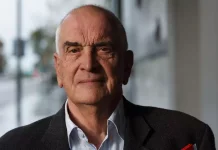Day 2 of General Synod has drawn to a close and I think it’s fair to say that the consensus is that, all in all, it’s been a good day.
While most of the attention will naturally have been on the closing debate, we spent the morning and first half of the afternoon working through other important items of business. There were more bills to work on and then a series of motions arising from the recent work done to learn more about and then report upon domestic violence within the Anglican Church of Australia (“ACA”).
Last year we saw media headlines reporting that rates of such abuse within the ACA were essentially the same as those in the broader population. The reporting was accompanied by accusations that conservative teaching on gender roles was a contributing factor.
The debate in Synod was thankfully far less marked by such tropes as it could have been, helped by an excellent video presentation. Rev Tracy Lauerson who led the report team presented a suite of motions which Synod grappled with. There was some discussion around the use of “women” and “men” when it came to describing victims of family violence – the discussion centring around the tension between affirming that the majority of victims are women while also seeking to acknowledge that there are male victims – but Synod eventually passed the motion in question unaltered. We also passed motions seeking to establish funding for ongoing work.
All of this, however, was in some ways a preamble to the order of the day; the beginning of our debates on human sexuality. As we’ve previously reported, Synod is considering a set of “statements” setting out an orthodox position on marriage and sexual activity which also clearly state that we proscribe solemnisation or blessing of a same-sex marriage.
It’s fair to say that there has been some tension and anxiety leading up to this moment. Indeed previous attempts to schedule a General Synod had been designed to avoid such a debate. So it is my pleasure to report that the debate was very well handled by all involved. In large part this is due, by wide acknowledgement, to the excellent work as chair that the Primate Archbishop Geoff Smith is doing. His presidency over the General Synod is being praised by all those I speak to here across the theological spectrum and it does seem that his encouragement in yesterday’s presidential address for “healing” has been heard by Synod; while we are still divided in our position, the mood was as good as perhaps it could have been with strongly-held views expressed almost universally in helpful and conciliatory manner.
The two hour opening session in this block of debates was all spent considering the first Statement – Marriage as union of a man and a woman. Archbishop Kanishka Raffel of Sydney moved the motion and his speech outlined 4 arguments:
- Why the statement? It was necessary because of the Appellate Tribunal’s opinion. It had used a narrow definition of “doctrine” but also noted that it was the place of General Synod to make statements and provide clarity on the broader concept of doctrine. This is what we are doing.
- What does Jesus teach? Here Archbishop Raffel provided a classic defence of marriage working outwards from Matt. 19:4-6
- What of gay marriage? It is not within the Christian understanding. Whenever the Bible addresses sexual activity outside of marriage it is always negative. We cannot bless what is contrary to God’s good purposes.
- What do we say to our gay/lesbian neighbour? We all want what is best for them, most of all that they experience God’s love, but it is unloving to distort diminish or deny the word of Jesus.
The motion was seconded by Rev Natalie Rosner of Melbourne who spoke to the difficulty of the topic being raised. She argued that such clarity was, however, now needed given the pressures that the change in the Marriage Act had brought upon us, particularly given the impacts upon religious freedom and the ability to act according to conscience. Exemptions were available for genuine religious beliefs but those beliefs had to be set out clearly.
We then moved to a set of amendments. Three of the amendments were effectively variations on the same theme, seeking to make the statement say in effect “this is where we are now” but leaving open the concept of change. For their proponents and supporters this was a better reflection of how they understood the current situation and they also argued it would meet the legal requirements of clarity that Rosner had argued were necessary. All three amendments were ultimately lost by similar margins of approx. 90-95 to 150.
One amendment that did succeed noted that resolutions in 2004 did not condone blessing of SSM nor ordination of people in same-sex relationships but also stated that both matters were subject to ongoing debate. It also spoke to “an obligation to listen to each other with respect”. It also described the change in the Marriage Act and noted that it “[presented] this church with a profoundly altered missional and pastoral context”. It was passed 195 to 49.
We then moved to debating the amended motion. Speeches moved along expected lines with the full expected spectrum of views being expressed. In particular there were several arguments that the debate was not closed and also that marriage was simply not as important an issue – it was not in the creeds etc. Supporters of the motion tended to lay out Biblical defences and restated the need for clarity at this time. I sought to live-tweet the debate in full, albeit as well as I could.
Very soon our two hours were upon us just at the moment that the debate seemed to be completed. The chair, seeing that there was not sufficient time for a right of reply from the mover, let alone a vote, adjourned us.
We’re scheduled to take this debate up at 1030am tomorrow, unless the business committee proposes an alternate plan.
So how will the vote tomorrow go?
The fairly consistent numbers for the three failed amendments do appear to give a clear indication what the final vote will look like. Overall we should expect to see a majority of around 150-90. But it is also apparent that there will be a call for a vote by houses. It is acknowledged that both houses of laity and clergy will pass the motion and so attention naturally turns to the House of 23 Bishops. What will they do?
The conversation around Synod is that a vote of 13-10 against is quite possible. But will the Bishops be prepared to reject and oppose the strong majority of both laity and clergy? If they do then what will happen next?
And after resolving that conundrum there are a number of other related motions on the paper still to be resolved. It may yet take all the skill of the Primate to see us through the next 24 hours and more – but he has given us more than enough evidence that he’s certainly capable of it.
At the very least he has done his own part in healing the tone of the debate, but can the division itself be mended?










